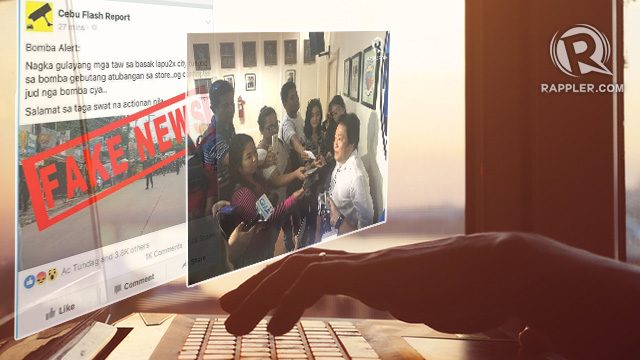SUMMARY
This is AI generated summarization, which may have errors. For context, always refer to the full article.

CEBU CITY, Philippines – In July 2017, a number of schools in Cebu City canceled classes following a social media post on an alleged bomb threat. Cebu Flash Report (CFR), a popular Facebook page, carried the unverified post on its news feed and amplified it to its almost 400,000 followers.
After authorities established that the threat was fake, CFR took down its post. Unfortunately, the post lingered long enough on social media to cause unnecessary panic among residents. (READ: Cebu journalists seek charges vs ‘fake news’ page admin)
This incident was shared by Sol Amante, editor of local newspaper SunStar Cebu, during the panel discussion at #MoveCebu: Social good in the digital age. The event was organized by MovePH, Rappler’s civic engagement arm, at the University of San Carlos (USC) on Thursday, August 30.
“Nobody had taken the pains to verify it, and when mainstream media called out to verify it, they said, inggit lang kayo sa traffic namin (you are just envious of our online traffic),” Amante said.
Unlike mainstream media and many other blogs, Cebu Flash Report is run by anonymous personalities, which means they have no public accountability.
At Move Cebu, experts like Amante warned Cebuanos about popular but anonymous social media pages like Cebu Flash Report. Amante said Cebuanos should take posts from CFR and similar pages with a “handful” of salt.
Impact on social media
The bomb scare incident, after all, was not an isolated case.
“We in the mainstream have some issues regarding CFR because, for one thing, we have documented several instances of them using content that isn’t theirs and passing off as original content,” Amante added.
The Cebuano news editor also shared how the photos posted by their reporters during the coverage of the Metro Gaisano mall fire in January were reposted on the same Facebook page without permission.
While not all of CFR’s posts are bad or false, Amante cautioned Cebuanos about posts from CFR and other similar pages. Echoing this call, Nestor Ramirez, member of the Cebuano Association for Communication Educators, pushed for media literacy to help combat the spread of disinformation online.
“It’s like we are not aware of the power of a very important tool that we always carry. We treat our gadgets like a toy. We don’t understand the consequences if we misuse this one. What is needed is for us to be educated and to be reflective of these consequences of misusing this very important tool,” Ramirez said.
The problem with online false information which Cebu journalists and the local academe face is not unique.
Global phenomenon
During the forum, Rappler CEO Maria Ressa also discussed how the technology has been used to attack media credibility, spread online disinformation, and promote “patriotic trolling” in the Philippines and worldwide.
“Where I led and loved technology, I started to see its dangers… What am I saying is that we are part of the global trend that is being taken apart all around the world,” Ressa said.
In the face of disinformation and trolling online, Amante, Ramirez, and Ressa agreed that there is reason to hope. Ressa, for example, recounted how social media have been used in the Philippines to save Filipinos during disasters, change the life of a street kid, and extend the life of an overseas Filipino worker who was put on death row.
“You are in the frontline on what social media can be. Are you going to use it for good? Are you going to use it for evil? Are you going to be part of the mob or the wisdom of the crowd?” Ressa asked.
Amante, on the other hand, reminded the public of their responsibility as a social media user.
“You don’t have to be a journalist to care about the quality of information that you share and post,” she said.
Heeding these challenges, USC students pledged to fight disinformation online and be responsible social media users. (READ: USC students pledge to fight disinformation, defend press freedom) – Rappler.com
Add a comment
How does this make you feel?
There are no comments yet. Add your comment to start the conversation.